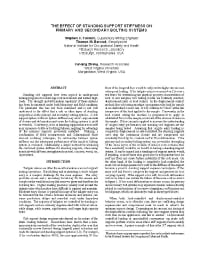Mining Publication: The Effect of Standing Support Stiffness on Primary and Secondary Bolting Systems
Original creation date: August 2003
Authors: SC Tadolini, TM Barczak, Y Zhang
NIOSHTIC2 Number: 20023435
In: Peng SS, Mark C, Khair AW, Heasley KA, eds. Proceedings of the 22nd International Conference on Ground Control in Mining. Morgantown, WV: West Virginia University, 2003 Aug; :300-307
Standing crib supports have been applied in underground mining programs to resist large roof movements and sustain highloads. The strength and deformation capability of these systems has been documented under both laboratory and field conditions. The parameter that has not been examined and is not well understood is the effect that a crib or other types of standing support has on the primary and secondary bolting systems. A crib support system with low system stiffness may allow large amounts of closure and deformation and cause the bolting systems to yield or even fail. Conversely, cribs or standing support that are too stiff may experience brittle or buckling failures, negating the advantage of the intrinsic supports previously installed. Utilizing a combination of field measurements and 3-dimensional finite element modeling techniques, the relationship between system stiffness and the subsequent performance of the installed bolting system is evaluated. Additionally, a simple method for calculating the combined system stiffness for standing supports, when using materials with different strengths such as steel, concrete, wood, etc., is presented.

NIOSHTIC2 Number: 20023435
In: Peng SS, Mark C, Khair AW, Heasley KA, eds. Proceedings of the 22nd International Conference on Ground Control in Mining. Morgantown, WV: West Virginia University, 2003 Aug; :300-307
- CFD Modeling of Fire Spread Along Combustibles in a Mine Entry
- Clay Veins: Their Occurrence, Characteristics, and Support
- Computer Simulation of Ground Behaviour and Rock Bolt Interaction at Emerald Mine
- Evaluation of the Relative Importance of Coalbed Reservoir Parameters for Prediction of Methane Inflow Rates During Mining of Longwall Development Entries
- Experimental and Modeling Investigation of the Effect of Ventilation on Smoke Rollback in a Mine Entry
- Modeling and Data Analysis of 50 to 5000 kHz Radio Wave Propagation in Coal Mines
- Preventing Falls of Ground in Coal Mines With Exceptionally Low-Strength Roof: Two Case Studies
- Reservoir Engineering Considerations for Coal Seam Degasification and Methane Control in Underground Mines
- Variation of Horizontal Stresses and Strains in Mines in Bedded Deposits in the Eastern and Midwestern United States
- Zen and the Art of Rockbolting